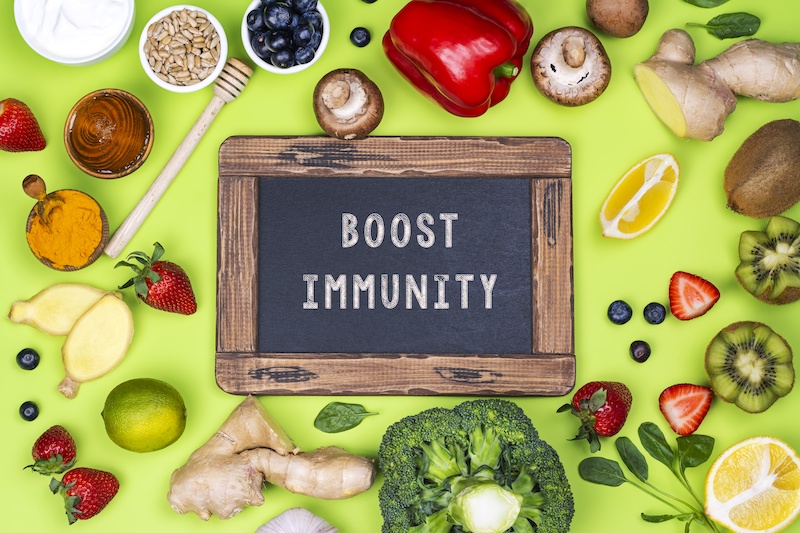Topics

Photo courtesy of Getty Images
Like many people, I was told to eat oranges daily or take a vitamin C supplement during seasonal illnesses to help boost my immune system. While this is great advice, there is more we can do to achieve this goal. The immune system is multi-layered and complex – which makes it hard for a single food or vitamin to meet the demands required to keep our immunity strong.
While eating a balanced diet is one way to support a healthy immune system, other important factors include:
- Consistent physical activity
- Getting enough sleep
- Lowering mental stress
- Staying hydrated
Oftentimes, when one or all of these factors are not addressed, it can cause inflammation, triggering an immune response. When inflammation is persistent and the immune response has not been allowed to come back to baseline, it can actually depress the immune system!
Gut microbiome: What is it and why does it matter?
In Harvard’s article on Nutrition and Immunity, the authors write “The gut is a major site of immune activity and the production on antimicrobial proteins.” The gut’s microbiome, in short, is the system of microorganisms, or “microbes,” that live in your gastrointestinal tract and play many roles in the body’s daily functions. In recent years, there has been a growing amount of research that shows how changes in the microbiome have a larger effect on the whole body. The microorganisms vary, with some being beneficial and others being potentially harmful. Harvard’s article on the Microbiome states, “Environmental exposures and diet can change one’s microbiome to be either beneficial to health or place one at great risk for disease.” In the article “Nutrition and Immunity,” by Harvard, consuming a plant-rich diet, high in fiber with a variety of fruits, vegetables, whole grains and legumes can promote beneficial microbe growth. I. Molendijk, a researcher, observed that the Westernized diet – high in sugars and red meat, and low in fruits and vegetables – causes disturbances in the microbiome, leading to inflammation and depressed immunity.
So what should we be eating? The next section discusses the general healthy diet and focuses on the specific micronutrients that are required in the many stages of immune function.
What to eat to support immune health
Harvard’s article found research that indicated certain dietary patterns, especially those rich in the vital nutrients necessary to create and support cells of the immune system, may better help the body prime itself to fight off certain illnesses and diseases. Focusing on a diet with good proteins (see below), whole grains, heart healthy fats and a variety of vegetables and fruits is beneficial to your overall health. Again, ensuring gut health is balanced and avoiding foods and beverages that may trigger inflammation will improve immune function.
The following micronutrients, or group of vitamins and minerals, are heavily used by the body in the creation and function of immune cells. The list of foods is not all inclusive but contains many commonly eaten foods.
- Vitamin A: Sweet potato, beef liver, spinach, carrots, dairy products (milk and cheese), peppers, mangoes, fortified breakfast cereals, eggs, black eyed peas, seafood.
- Vitamin C: Broccoli, grapefruit, kiwi, leafy greens, melons, oranges, bell peppers, strawberries, tangerines and tomatoes.*
- Vitamin D: Cow’s milk and dairy milk alternatives fortified with vitamin D, fortified breakfast cereals, fatty fish (salmon, trout and tuna), cheese and eggs.
- Vitamin E: Vegetable oils (wheat germ, sunflower and safflower oils), nuts, seeds, vegetables (spinach and broccoli) and fortified breakfast cereals.
- Zinc: Lean meat, poultry, seafood, milk, whole grain products, nuts and seeds.
- Selenium: Seafood, meat, poultry, eggs, dairy products, fortified cereals and other grain products.
- Iron: Lean red meat, seafood, beans, dark leafy vegetables (spinach), dried fruit** (raisins or apricots), peas, iron-fortified cereals, breads and pastas.
- Protein: Lean red meat, poultry, eggs, seafood, beans, peas, soy, nuts and seeds.
*Iron absorption is enhanced when eaten alongside foods and beverages rich in Vitamin C.
**½ cup of dried fruit is equivalent to 1 cup of fresh, raw fruit.
In cases when individuals avoid certain foods or whole food groups, taking a generic multivitamin and/or mineral supplement that meets the Recommended Daily Allowance (RDA) values, may be recommended to ensure all nutrient needs are met. Please consult your physician before starting any supplement.
During these times when strengthening your immunity is so important, consuming micronutrient-rich foods that promote gut health and keeping your physical and mental health in check are necessary to help support your immune system.
To learn more about nutrition services at Texas Children’s, visit our website. We’re looking forward to sharing more information with you as we celebrate National Nutrition Month 2021.